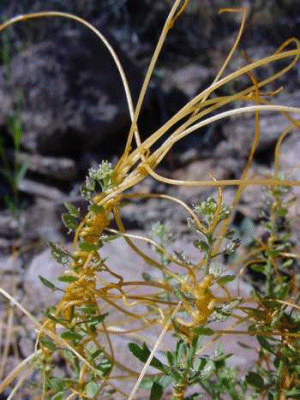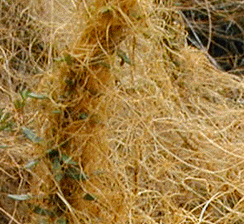


IMPORTANT: The information provided is for information only. The medical claims or advice are not endorsed. Never take any medicines without first consulting a qualified practitioner.

The name love bush comes from a Jamaican children's game. You toss a piece of the dodder plant at a tree and call out the name of a hoped-for lover. If the dodder sticks and grows, true love will flourish.
Traditional Caribbean medicine uses an infusion of a small piece, about an inch, of the vine for baby gripes and for colds, headaches and prickly heat.
It is also combined with button weed (Borreria laevis) and inchplant (Zebrina pendula, a species of spiderwort commonly known as an inchplant or wandering jew) to make a hot tea in order to stimulate menstruation.

Dodders are parasitic.They cannot make their own food, but rely entirely on other plants. Young dodders put out thready stems that climb up a nearby plant. They then send out small suckers, which eventually grow into the host plant's tissues. As soon as the dodder is firmly attached, its own root withers away, and it lives entirely from the sap of its host. In Britain, it's commonly found on gorse.
Dodders can be a serious pest, reducing the growth and vigour of the host plant and, in some instances, killing it. Their many common names of beggarweed, hellweed, strangle tare, devil's guts, show how much farmers hate them. One older writer commented, 'Hellweed … destroyeth the pulse, or at least maketh it much worse, and is called of the country people Hellweed, because they know not how to destroy it.'